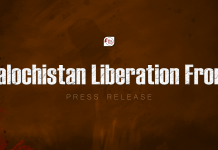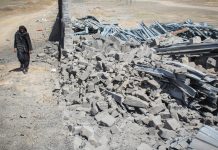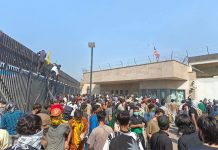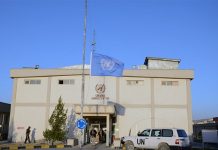Author: Abul Rohan Zehri
The beauty of Baloch nation and their homeland, Balochistan, lies in their unique culture blessed with compassion, equity, sel-sacrifice and secular norms. The religion has nothing to do with political, social, tribal and economic norms and affairs of Baloch society, except a worship. This unique characteristic of Baloch way of social and individual life makes them a distinct nation from other regional ethnic communities. Baloch society is intrinsically secular, the women enjoy equality, respect and immense say in decision making. The women even carry out non-traditional jobs such as farming alongside men, in addition to other household or livelihood works.
The religious extremisim and orthodoxy were an alien phenomenon in Baloch society until recent times. However, due to external factors and a deliberate policy to islamize the region efforts are afoot to penetrate religious orthodoxy with a view to distort original Baloch culture. It is pertinet to mention here that other day the scribe was on his way to Khuzdar from Quetta when somewhere near Kalat district the vehicle of mine broke down due to overheating of the engine. Thus, there was acute need of water so I looked around for a place to bring water. I set off and after walking some distance, found a house in outskirts. When I reached there, a women came out. Before she could say something, I enquired if I could get some water. She politely replied in affirmation and called a young male family boy to help me. Besides providing me water they stressed to eat something in their home but I thanked them for their benevolence then the women asked the boy to take me on his motorbike to my vehicle which was parked on main highway some two kilometres away from their home. This was not first such incident where Baloch women greet a strange man and assist a desperate person, rather the entire Baloch history is awash with such example of women empowerment, compassion and marvelous tradition of helping desperate people even if man folk of family is not present.
Additionally, the Baloch culture is quite akin to primitive commune system where cooperation, self-sacrifice, compassion, gender equality, generosity are the integral features of routine life. However, the fate of such a great nation is marked by poverty, death, disease, illiteracy, lack of pure drinking water, hygiene, transportation, healthcare facilities, freedom of expression and democratic rights.
Despite having a rich and good-hearted culture, billions of dollars worth of mineral resources, long coastal line, tremendous geographic location, intelligent young population, yet the Baloch are entrapped in the net of innumerable miseries. According to an estimate more than 50 percent population of Balochistan province lives below the poverty line. Since 1st July, 1970 when Balochistan was granted status of a province, the Baloch sardars have dominated the political and economic power in the most underprivileged region of South Asia. The tribal chiefs alternatvely rose to power with connivance of powerful establishment, yet they did not make an iota of effort to improve governance so that uplifts the socio-economic conditions of Baloch masses.
The political scenario is pretty bleak in Balochistan. Contrary to federalist parties, the local nationalist parties have also committed betrayal with Baloch nation by employing nationalist slogans to obtain power and then befool naive Baloch masses. Whenever, these pseudo nationalist parties have come into power, they have been a tool in the hands of those forces who have been exploiting Baloch nation for decades. After erstwhile Tribal areas, Balochistan has highest illiteracy rate in Pakistan as 85 percent rural population suffers from multi-dimensional poverty and 38 percent urban population is grappling with multi-dimensional poverty. A large segment of Baloch society is undernourished. However, the corrupt and inept federal and provincial governments have miserably failed to provide pure drinking water to the majority of population. The unemployment rate in Balochistan is more than 4 per cent. The provincial goverment has no concret strategy to reduce unemoloyment rate and provide jobs to the educated youth. On the other hand, the unemployment rate is surging annually.
The construction of infrastructure plays a key role in socio-economic development of any region but, unfortunately, in terms of infrastructure, Balochistan province is considered the most backward. Out of total road network in Pakistan, the province of Balochistan has only 11.3 per cent of total road networks in Pakistan, which is lowest in all provinces. The topograpgy of province is mostly comprised of hilly and far-flung terrain. The people have to face severe kinds of problems to bring their agriculture products to markets. Major gas fields that cater to the energy needs of Pakistan are located in Sui and Dera Bugti areas of Balochistan. Besides, numerous other natural resources, the Reko Diq copper and gold project in Chaghai district contains billions of dollars worth copper and gold reserves but, unfortunately, in 1993 few inept buearucrats of government of Balochistan in return of merely 2 percent royalty handed over the mining rights to an Australian company called BHP which thereafter sold its shares to a joint Consortium named TCC. However, shocking revealations were made in Supreme Court of Pakistan regarding terms of this agreement and huge quantity of copper and gold reserves in Reko Diq project in Taftan area of Chaghi Distric. The Supreme Court having find immense irregularities in the agreement, declared the agreement as illegal, void and prejudicial to the interest of Balochistan province. Hence TCC approached legal investment arbitration forums where due to inept leadership, the government of Balochistan lost the case consequently, it faced with humiliation of $5billion fine imposed upon government, which will also be paid from tax payers money.
The ruling establishment has treated Balochistan as a colonial region keeping in view of its strategic location and mineral resources. The people of Balochistan have never enjoyed the democratic or rights granted under constitutionalism. Even though the Constitution of Pakistan recognizes Balochistan as a province. However, as a matter of fact the Balochistan has never been given status of province rather has been governed and managed as an administrative District under control of powerful establishment. The Chief Ministers of province have never been more powerful and independent than a Deputy Commissioner of a District. From very outset, the rulers of Balochistan have been imposed upon masses like a selected group presently has been imposed upon Baloch and Balochistan. Gawadar sea port and China-Pakistan Economic Corridor (CPEC) projects were initiated without negotiating the terms with Baloch leadership and the benefits of these mega international, worth billions of dollars, projects are not being extended to local Baloch population.
The erroneous policies towards Baloch and Balochistan have made matters worse. The Baloch youth have embarked upon an audacious resistance against repressive and tyrannical policies since 2004 which still continues despite brutal counter insurgencies unleashed by state and proxies in which thousands of Baloch youth, intelligentia, journalist and political activists have either been killed or detained in torture cells and their whereabouts are not known by their family members. The genuine Baloch grievances are required to be resolved politically and diplomatically but, the establishment resorted to crush Baloch rights movement by dint of repression which has proved counter productive and will exacerbate the situation in restive province. The Baloch issue is a political conflagration which must be resolved through political means rather than resorting to violence. The people of Balochistan have been facing, exploitation, repression, plunder of resources, denial of political, social, economical, democratic and fundamental human rights for long. In the current world politics, the multi-nation states have realized that integrity of such nation can only be protected if undermine the majority democracy in order to put in place a setup or dispensation of constitutionalism so as to resolve the grievances of minority ethnic communities.
Since its inception in 1947, Pakistan has been confronting multiple issues surrounding its heterogenous population comprised of multi ethnic and multi nation demography. The solution lies in Constitutionalism. Pakistan’s Constitution of 1973 does not provide a fair and fine rights to minority nationalities like Baloch. Therefore, it is high time that a new social contract among various nationalities must be signed guaranteeing the political, economic and social rights of minority nations if this federation is to survive.
___________________________________________________
Disclaimer: The views and opinions expressed in this article are those of the author and do not necessarily reflect the official policy or position of The Balochistan Post or any of its editors.






























